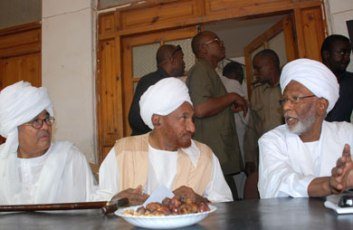Sudanese opposition warns of potential failure in Khartoum-Juba talks
September 3, 2012 (KHARTOUM) – The coalition of mainstream opposition parties in Sudan has warned against the consequences of failing to reach agreements on contentious issues with neighbouring South Sudan within the deadline set by the UN Security Council (UNSC), accusing the Khartoum government of inviting such an eventuality by procrastinating in the talks.

Sudan and South Sudan are due to resume negotiations over post-secession issues in the Ethiopian capital Addis Ababa on Tuesday. The UNSC extended until 22 September the deadline it gave to both countries to conclude talks or face non-military sanctions as stipulated under resolution 2046 which the UNSC adopted following the eruption of fighting between the two neighbours around the oilfields of Heglig.
The previous round witnessed a yet-to-be-signed agreement on oil transit fees and the next round is expected to focus on the creation of a demilitarized zone along the border and cessation of alleged support to rebel groups.
Omar said he does not rule out the failure of the talks and referral of the disputes to the Permanent Court of Arbitration due to what he described as the procrastination of Khartoum government in reaching a comprehensive settlement.
The opposition official also touched on the issue of armed conflicts in Sudan’s border region of South Kordofan and Blue Nile. He said that the framework agreement that the government signed with the rebel Sudan People’s Liberation Movement North (SPLM-N) on 28 June and later disavowed could have contributed to resolving the problem in the two regions. Omer accused some elements within the ruling National Congress Party (NCP) of “vetoing” the agreement and obstructing its implementation.
Turning to the domestic arena, Omar commented on talk about the NCP’s intention to invite opposition parties for consultations on a new constitution. According to Omer, NCF factions, which also include the National Umma Party (NUP) of Al-Sadiq al-Mahdi and the Sudanese Communist Party (SCP), reject any dealing with the NCP and remain firmly committed to the goal of regime change.
“We are talking about the fall of the entire regime after it failed to run the country” he intoned. Omar added that the protests that occurred in the country in response to the ending of fuel subsidies were “a rehearsal for the upcoming revolution”.
On a separate issue, Omar encouraged Islamist parties in the Arab world to boycott the Islamic Movement (IM) conference that the NCP intends to organize in November. He described the IM as a privately owned entity, in a veiled reference to its perceived conflation with the NCP.
Meanwhile, Sudan Tribune has learned that Omer’s boss and PCP leader Hassan al-Turabi is due to travel on 9 September to the Qatari capital Al-Doha. While the purpose of the visit is unknown, Al-Turabi’s previous visits to Doha were organized to hold interviews with the prominent TV channel Al Jazeera.
Al-Turabi’s last interview with Al Jazeera was two years ago but Al-Jazeera failed to broadcast it for what some speculated as fears of fraying relations between Doha and Khartoum after the Islamist opposition leader spoke about sensitive issues including the alleged involvement of Sudanese officials in the attempted assassination of former Egyptian President Hosni Mubarak in 1995.
(ST)
